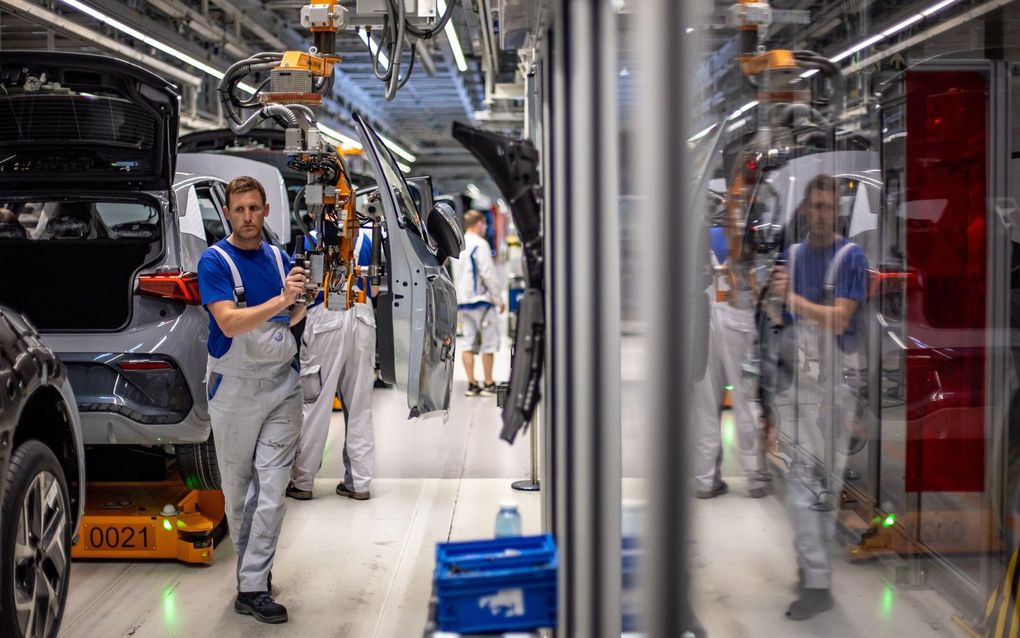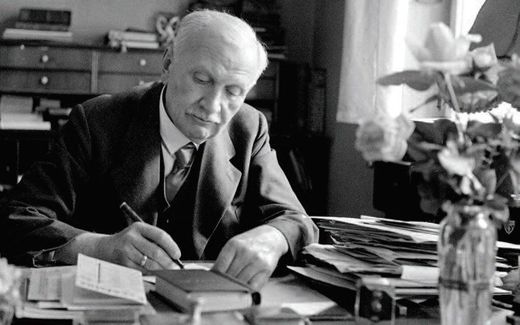How the Reformation shaped the well-known German work ethics

An employee uses lifting equipment to attach doors to an ID.3 automobile on the electric cars production line at the Volkswagen (VW) vehicle factory in Zwickau, Germany. Photo EPA, Martin Divisek
Opinion
Germany is known for its punctuality and work ethics. It is also the country where the Reformation started. Coincidence? No, says Cédric Placentino.
Stay up to date with Christian news in Europe? Sign up for CNE's newsletter.
There is an area in Germany where it is possible to drive on the autobahn for about an hour without seeing the countryside. This area is known as the Ruhrgebiet, and it is the symbol of Germany’s industry.
Although some may lament that ugly factories have replaced the green fields, the Ruhrgebiet has lifted countless German families out of poverty over the past two centuries.
The fact that Germany is an industrialised nation is taken for granted nowadays. However, few people remember that this is only a recent phenomenon. Even fewer know this would not have been possible without the impact of the Reformation in Germany.
Toil and Work
The Reformation is mainly known as a dispute over the doctrine of salvation of the Church. Indeed, it all started there, but it developed into a full-orbed transformation of society in the nations where the Reformation was adopted.
A crucial element was the recovery of the Biblical understanding of work. Man’s dominion over God’s creation (Genesis 1:26-28) meant work. The work that God instituted was intended to be a blessing, but the fall transformed work into a curse of toil. But this curse was undone by Jesus Christ at the cross. The restoration of mankind in Jesus Christ was also meant to restore the enjoyment of work according to God’s initial intent.
Martin Luther understood what work would have looked like in a sinless world:
“For [man] was so created, that as long as he lived in this corporeal life, he might cultivate the earth, not as doing a work of trouble, nor as wearying his body with labour, but as enjoying an employment of the highest pleasure; not as ‘deceiving, or killing time,’ (as we say) but as performing a service to God, and yielding an obedience to His will”, he writes in his book “The Creation: A Commentary on The First Five Chapters of the Book of Genesis”.

Martin Luther believed that work was to serve God in obedience to His will. Toil, by contrast, resulted from disobedience and not performing a service to God. This basic difference between work and toil, rediscovered by Martin Luther and other Reformers, brought a remarkable transformation in Christendom.
Capitalism
At the beginning of the twentieth century, the German sociologist and economist Max Weber was one of the first scholars to study the impact of religious beliefs on economics. This led him to write his famous “Die protestantische Ethik und der Geist des Kapitalismus” (The Protestant Work Ethics and the Spirit of Capitalism). At the beginning of the book, Weber started with a remarkable observation of the difference in attitudes toward business among Protestants and Roman Catholics:
“A glance at the occupational statistics of any country of mixed religious composition brings to light with remarkable frequency a situation which has several times provoked discussion in the Catholic press and literature, and in Catholic congresses in Germany, namely, the fact that business leaders and owners of capital, as well as the higher grades of skilled labour, and even more the higher technically and commercially trained personnel of modern enterprises, are overwhelmingly Protestant.”
Was it pure coincidence that Protestants were generally more successful in business than Roman Catholics? Some people explained that Protestants, who usually had larger wealth than Roman Catholics, got better access to education and thus were better trained to develop enterprises. This may have been true, but it still left the question unanswered and actually raised another crucial one: Why were Protestants wealthier people than Roman Catholics?
Wealthier
Moreover, this analysis borrowed a lot from a false preconception according to which economics alone can explain any societal phenomenon. This view, which was popularised by Karl Marx, failed to give a reason as to why Protestants were more successful in enterprise. Moreover, according to Weber, wealthier Roman Catholics were less interested in getting trained in business.
Other people tried to answer the question from the viewpoint of economic rationalism, i.e. the development of tools allowing for greater productivity. According to this view, the development of such tools led the Protestant nations to become wealthier than others. This also may have been true. The scientific revolution was indeed particularly strong in Protestant nations such as England and Germany.
Yet, before the Reformation, such economic rationalisation had already taken place in the Roman Catholic world. There, it did not lead to a massive increase in prosperity for all layers of society.
Beruf
The general mentality in nations with a Protestant background is that one ought to have a sense of duty toward work. Even in the rapidly decaying societies of these nations, this remains true for Christians as well as for non-Christians. Although such a sense of duty is not exclusive to the Protestant nations, it remains nonetheless more acute in those societies. So, why is this the case? Max Weber answered:
“Now it is unmistakable that even in the German word Beruf, and perhaps still more clearly in the English calling, a religious conception, that of a task set by God, is at least suggested. The more emphasis is put upon the word in a concrete case, the more evident is the connotation.
And if we trace the history of the word through the civilised languages, it appears that neither the predominantly Catholic peoples nor those of classical antiquity have possessed any expression of similar connotation for what we know as a calling (in the sense of a life task, a definite field in which to work), while one has existed for all predominantly Protestant peoples.”
Max Weber went on to affirm that the fact that this idea arose in countries like Germany or England has nothing to do with ethnicity. Rather, it had to do with Bible translations. Hence, the Reformation introduced in those societies “the valuation of the fulfilment of duty in worldly affairs as the highest form which the moral activity of the individual could assume.”
This came in stark contrast with the monastic ideal in Roman Catholic thought, where being holy meant getting out of worldly activities. This did not mean that monks did not work. They did and greatly contributed to the development of industries such as agriculture through the tools and techniques they developed. However, the Roman Catholic worldview, which was inspired by Greek asceticism, viewed prayer and meditation as of a higher spiritual significance than working in God’s creation.
Brotherly love
Martin Luther had started himself as a monk, but he ended up rejecting the Roman Catholic worldview regarding work. He finally came to the conclusion that “labour in a calling appears to him as the outward expression of brotherly love.” Luther understood that “the fulfilment of worldly duties is, under all circumstances, the only way to live acceptably to God. It and it alone is the will of God, and hence every legitimate calling has exactly the same worth in the sight of God.”
Max Weber explained that Luther’s impact on the concept of “calling” was still limited because of his emphasis on salvation by grace. Contrary to Calvin, Luther still continued to see works with suspicion. This may explain the slight difference seen between Calvinist and Lutheran societies that Weber noticed. Nonetheless, the Reformation brought a significant change in the attitudes toward works even in Lutheran countries.
The transformation of attitudes toward work that the Reformation has brought was indeed the main source behind the industrialisation of Germany, which lifted so many families out of chronic poverty.
Related Articles














